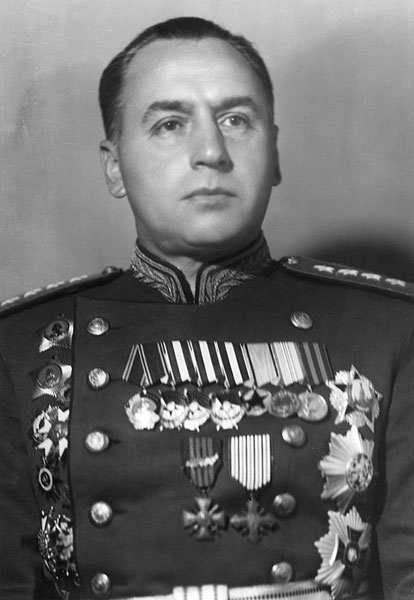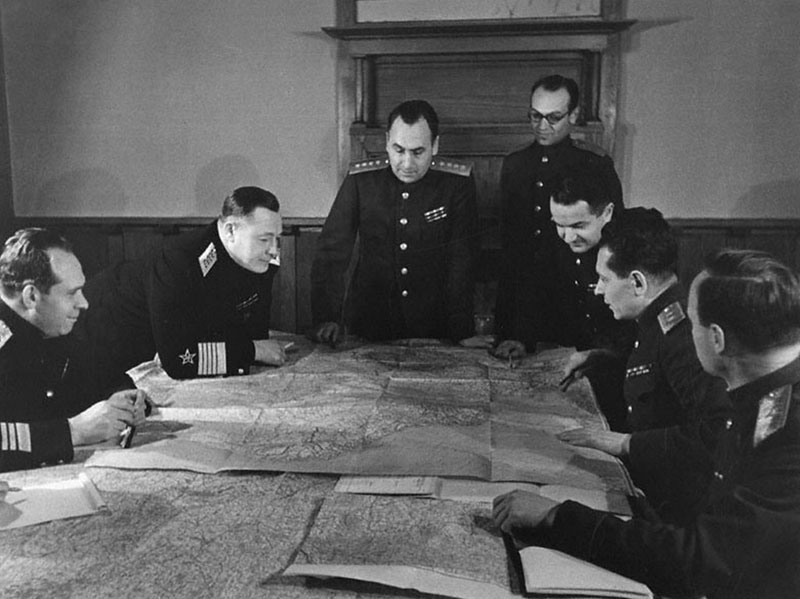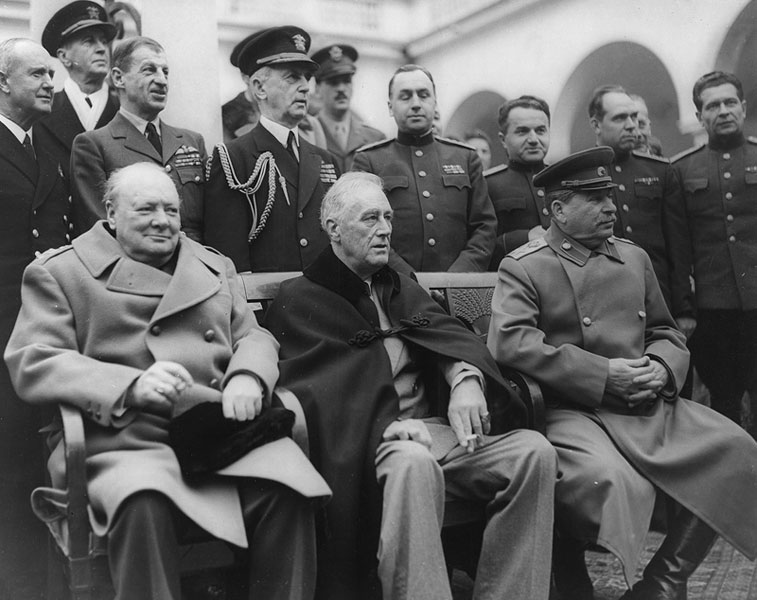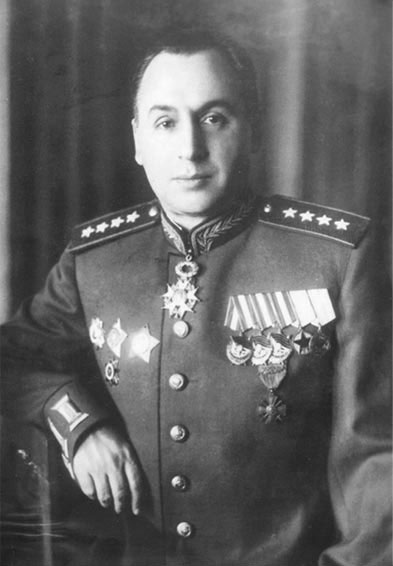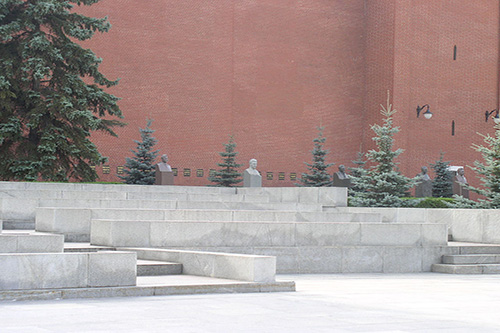Aleksey I. Antonov
Introduction
Aleksey Antonov is not among to the best known Soviet generals but experts consider him one of the most highly gifted staff officers of the Red Army. He was known for his broad theoretical knowledge, his intelligence, calm and mental strength. From December 1942 onwards, he headed the Directorate of Operations and from February 1945 he was Chief of the General Staff, making him closely involved – usually as a member of the triumvirate Zhukov (Bio Zhukov) – Vasilevski – Antonov – in planning almost all major operations of the Red Army.
Early years
Aleksey Innokentyevich Antonov was born September 9, 1896 in the town of Grodno in the Russian Empire (nowadays Grodna in the extreme west of Byelorussia). His family were Volga-Tatars. He was second of the three children of Innokenty Antonov, a captain in the artillery and his spouse Tereza, a housewife of Polish origin. This meant Aleksey spoke Russian as well as Polish at an early age. Antonov senior and his artillery unit were transferred to the west of the Ukraine in 1904 so the family moved with him.
Considering Antonov’s sickliness, his shyness and his nervousness, a military career was not an obvious choice. Antonov senior had accepted the fact the military tradition of his family would not be continued but he was closely involved in his son’s physical and intellectual development. Aleksey learned to ride horse back and how to play chess and he visited army barracks and former battlegrounds with his father. At an early age he learned to speak German, French and English rather well. Antonov attended the gymnasium in the city of Ostrog, excelling in history, geography and literature.
Antonov senior passed away in 1908. Thereafter, the family moved to Petrograd (nowadays Saint Petersburg) and could sustain itself on its military pension for next of kin. In 1915, Antonov’s mother died as well. Meanwhile, Antonov had graduated from gymnasium and managed to register at the university but he could not begin his studies owing to a lack of financial means. Moreover, in 1916, the second year of the war, he was drafted for military service.
In military service
After accelerated military training, Antonov was posted to an infantry regiment as a cornet. Early 1917, his regiment fought on the Southwestern Front commanded by the well known general Brusilov. In the six months he had spent at the front, Antonov was injured and was awarded the Order of Saint Anna for bravery. Early 1918, his regiment was disbanded and Antonov left the army for a short while but in 1919 he decided to join the Red Army.
In the Bolshevist army, Antonov was appointed assistant chief of staff of the 3rd Fighter brigade which was deployed during the Civil War near Lugansk in the southern Ukraine. In this period, his superiors described him as attentive, modest and well mannered and he excelled by his thorough knowledge of military affairs. Towards the end of the Civil War he had risen to chief of staff of the 45th Fighter brigade.
At this point in time, Antonov had only attended a short N.C.O. training and so he started studying at the famous Frunze Military Academy in Moscow. Here he could broaden his views on operational strategy, study new ideas – due to his linguistic capabilities he also studied foreign literature on the theory of combat – and could delve into military-technological developments. Antonov graduated in 1931 and was appointed chief of staff of the 46th Fighter brigade, stationed in the Ukraine. In 1932 he returned to Frunze Academy for a course at the new Faculty of Operations. He graduated with honors and in 1935 he was appointed chief of the Department of Operations in the Kharkov Military District. During a large scale and complex exercise later that year, he was praised for his planning and coordination. He was subsequently promoted to Colonel. In 1936 he continued with a training at the newly established General Staff Academy. During this period, he met many of the – future – big men of the Red Army, including Iona E. Yakir, Matvei V. Zakharov, Nikolai F. Vatutin and Aleksandr M. Vasilevski (Bio Vasilevski).
Antonov left the General Staff Academy prematurely as many posts had become vacant as a result of the Great Purges. In the summer of 1937, he was appointed chief of staff of the Moscow Military District in the rank of kombrig, the lowest rank of senior officers. From 1938 onwards, he was back at Frunze Academy, this time as an instructor and from January 1941 as vice deacon of the Faculty of General Tactics. He now held the rank of major-general and occupied himself mainly with German offensive tactics and the tactical deployment of armored forces.
Fifteen months at the front
Antonov was pleased when he was allowed to leave university in January 1941 following his appointment as deputy chief of staff of the Kiev Military District. One of his responsibilities was bringing units, often lacking a quarter of their number up to battlestrength. When the Germans invaded the Soviet Union, the numerical strength of the Kiev District was rather imposing but the faulty deployment of the troops and the shortage of armored forces led to massive defeats. Later that summer, Antonov became chief of staff of the Southern Front that managed to push back the Germans near Rostov at the end of the year. Here, Antonov’s forces engaged the 1. Panzerarmee of Generalfeldmarschall Ewald von Kleist whose works Antonov had studied at university. On December 27, 1941, Antonov was promoted to Lieutenant-general for his contribution to the success at Rostov.
In July 1942, Antonov became chief of staff of the North Caucasian Front. In this capacity, he was responsible for the planning of operations such as the defense of the coast of the Black Sea. Again, Antonov distinguished himself by his calm, his erudition, organizational talent and selfdiscipline. The frontcommander called him the Sphinx of ice. In November he was given a new function: chief of staff of the Trans Caucasian Front. Early December 1942, General Aleksandr Vasilevski, Antonov’s old friend who meanwhile held the post of chief of the General Staff, paid a visit to headquarters at the front for a briefing on the military situation. Antonov’s presentation was, as always, concise and accurate and consequently, Vasilevski offered him the position of chief of the Directorate of Operations of the General Staff. Antonov, always wary, asked for time to think. When Vasilevski called him the next day telling him Joseph V. Stalin (Bio Stalin) had personally approved the recommendation, Antonov accepted the offer. He left for Moscow December 11.
The General Staff
The Directorate of Operations was poorly organized and before Antonov’s arrival it had been headed by seven different chiefs in six months. Hence, Antonov’s most important task consisted of bringing order to the directorate. Antonov was to report to Stavka daily, the seven-men military supreme command but in his first week, Antonov focused on the general strategic situation and the tasks and organization of his directorate only, in order to deliver a well informed report on the military situation. He restored order to the work of his staff and introduced an intensive and strict daily routine. Antonov usually had workdays of 17 to 18 hours and slept from 05:00 or 06:00 in the morning until noon. He developed a smoothly running partnership with his competent deputy Anatoly Gryzlov, Nikolai Lomov and above all with Sergei Shtemenko who would later rise to four-star general also and to chief of the General Staff.
The Directorate of Operations held three daily briefings for Stalin: Shtemenko made the report at 10:00 hours, Antonov did the same at 16:00 hours and also held the detailed nightly briefing assisted by Shtemenko. The nightly briefing was usually attended by the supreme commanders of the various branches and services: Fedorenko (armored forces), Voronov (artillery), Yakovlev (directorate of artillery), Novikov (air force), Khrulyov (rear areas), Peresypkin (communications) and Vorobyov (engineers). The meeting usually took some three hours. At the end, Stalin usually dictated the new Stavka directives that subsequently were written down and edited by Shtemenko and forwarded to the headquarters at the various fronts. Shtemenko noted the following about it in his diary:
"A large oblong table stood in the left of Stalin’s office, some distance from the wall. We unfolded maps on it and reported about each front separately, starting with those where the most important things occurred. We did not take preliminary notes as we both knew the situation by heart and as it was drawn on the map. A large globe stood behind the table, in the corner."
In his first few months, Antonov was to be found at the front frequently as Stavka representative but from April onwards, he usually remained in Moscow. It was Antonov who took the brunt of the work of the preparations for the battle of Kursk. April 4, 1943, Antonov was promoted to Colonel-general. In May , the Directorate of Operations was taken over by Shtemenko and Antonov was named first deputy chief of the General Staff. He now occupied himself exclusively with the planning of strategic operations and as Vasilevski was to be found at the front regularly, Antonov was actually chief of the General Staff and Stalin’s major military advisor. Owing to his increased responsibilities, Antonov was promoted to army general – four-star general – on August 27, 1943.
Whilst the Red Army advanced steadily westwards, more and more operations were coordinated with the British and the Americans. Antonov was given the date of Operation Overlord, the landings in Normandy by the Allied military mission in Moscow. Overlord was to coincide with Operation Bagatrion, the large scale summer campaign of 1944. In October 1944 he briefed Field Marshal Lord Alanbrooke about the situation on the Eastern Front during Winston Churchill’s visit to Moscow (Bio Churchill). In 1945 Antonov was in touch with the western Allies frequently. At the Yalta Conference of February 1945, Antonov reported about the situation at the Eastern Front to Winston Churchill, Franklin Roosevelt (Bio Roosevelt) and Joseph V. Stalin. He repeatedly urged the British and Americans to intensify their bombing raids in order to prevent massive numbers of German troops from being transferred to the Eastern Front. The figures Antonov presented were exaggerated but Churchill was impressed and once back in London, he ordered Sir Arthur Harris (Bio Harris) to step up the number of bombings on communication networks in eastern Germany.
February 18, 1945, Armygeneral Ivan D. Chernyakhovski, commander of the 1st Baltic Front, was killed in eastern Prussia by German artillery fire. Subsequently, Stalin decided to name Vasilevski his successor and appoint Antonov chief of the General Staff. During the rest of the war, Antonov kept busy planning and overseeing the offensive in the direction of Berlin. Early June, Antonov, together with Vasilevski who had returned from the front in the meantime, began drafting the campaign against Japan. At the Potsdam Conference in July and August, attended by Antonov, he briefed the Western Allies on the progress of these preparations. The campaign was a success and came to a victorious end just three weeks later.
Post war career
For Antonov, the war had been grueling physically as well as mentally; he had taxed himself to the limit and had received medical care frequently, possibly owing to a heart condition. In August 1945, at the end of the Potsdam Conference, Antonov suffered a heart attack. Nonetheless, he remained chief of the General Staff and in the post war years he oversaw the massive demobilization of eight million conscripts. In March 1946, Antonov returned to the post of first deputy chief of the General Staff. When the first phase of the demobilization was completed in 1948, Antonov was appointed first deputy commander and later commander of the Trans-Caucasian Military District. It was in fact a degradation but the post was far away from chilly Moscow where men like Lavrenty P. Beria (Bio Beria) who Antonov had always despised, were involved in a struggle for power in Stalin’s last days. In the Caucasus, Antonov visited his units in the field frequently and together with his wife Maria, he liked to attend the Georgian National Theatre.
In 1954, Antonov returned to Moscow to take the post of first deputy chief of the General Staff. In May 1955, the Warsaw Pact was signed and Antonov was put in command of the staff of the Combined Forces of the Warsaw Pact. In this capacity, Antonov played an important role in various military exercises. He drafted a coherent military doctrine and attuned the execution of command. The same year, Antonov’s wife Maria passed away and the following year, he married well known ballet dancer Olga Lepeshinskaya. Her company was of great value as his health deteriorated steadily. Eventually, Antonov passed away in Moscow, June 16, 1962 after having suffered a second heart attack. The urn containing his ashes was entombed in the wall of the Kremlin on the Red Square in Moscow.
In the course of his career, Antonov received various decorations, among them 12 Soviet orders and at least nine high foreign ones. He is often considered an underestimated general: although he was awarded the very rare Orden Pobeda (Order of Victory), he was the only recipient of this decoration who never made it to the rank of marshal. He was never named Hero of the Soviet Union either, an honor that was bestowed upon nearly all big men of the Red Army. After his death, efforts have been made to have this title posthumously awarded to him and even as late as 2003, a number of high ranking military, including four retired Soviet marshals and three four-star generals still advocated a posthumous hero’s title but to no avail.
Definitielijst
- brigade
- Consisted mostly of two or more regiments. Could operate independently or as part of a division. Sometimes they were part of a corps instead of a division. In theory a brigade consisted of 5,000 to 7,000 men.
- infantry
- Foot soldiers of a given army.
- Kremlin
- Soviet administrative centre in Moscow.
- Marshal
- Highest military rank, Army commander.
- offensive
- Attack on a smaller or larger scale.
- Red Army
- Army of the Soviet Union.
- regiment
- Part of a division. A division divided into a number of regiments. In the army traditionally the name of the major organised unit of one type of weapon.
- Soviet Union
- Soviet Russia, alternative name for the USSR.
- Stavka
- The high command of the Russian military forces in World War 2, chaired by Stalin.
- strategy
- Art of warfare, the way in which war should be conducted in general.
Images
Information
- Article by:
- Auke de Vlieger
- Translated by:
- Arnold Palthe
- Published on:
- 19-01-2025
- Feedback?
- Send it!
Related sights
Sources
- BIALER, S. (RED.), Stalin and his Generals, Westview Press, Inc., Boulder, 1984.
- CROSS, R., Citadel, Michael O'Mara Books, Londen, 1993.
- OVERY, R., Russia's War, Penguin Books, Londen, 1999.
- WOFF, R., 'Alexei Innokentievich Antonov', in H. Shukman (red.), Stalin's Generals, New York: Weidenfeld and Nicolson, 1993, pp. 11-23
